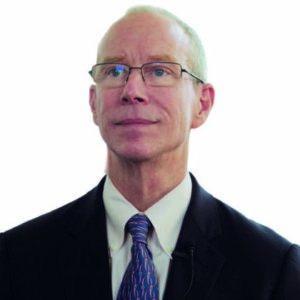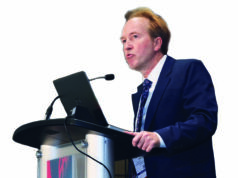
SVS secretary details the spirit and the cause behind the next phase of the Society’s branding campaign aimed at helping vascular surgery become an instantly recognizable specialty inside and outside of the hospital.
“We are not going to apologize for trying to educate the public and the referring physicians. There is no reason for us to apologize. And we also are not going to be negative to any other specialty. We are simply going to be positive and truthful about who we are and what we do and what we can do for vascular disease patients on their journey.”
Those were the words of William Shutze, MD, who has been given the task of leading the SVS’ ongoing branding campaign as Society secretary, in an interview with Vascular Specialist ahead of the launch of phase two later this year.
Shutze, also chair of the SVS Communications and Branding Committee, was detailing the need for greater public awareness of what a vascular surgeon does, and the comprehensive and longitudinal nature of the care vascular surgeons provide after a patient is diagnosed with a vascular condition.
But it is not just patients and their families the SVS campaign seeks to target. The Society also wants to pierce through into the consciousness of referring physicians, the C-suites of both healthcare systems and insurance payors, and also medical students.
Branding continually emerges as a top member concern or priority, Shutze explains. “Basically, as a specialty we are either not branded or misbranded, depending on how you want to look at it,” he says. “We are pigeon-holed into this concept of surgery.”
Despite past efforts to tackle vascular surgery’s recognition problem, “without a doubt we have fallen short,” Shutze admits.
So now the Society, with support from the SVS Executive Board and the Strategic Board of Directors, has taken steps to up the ante. A substantial seven-figure sum has been committed to the effort, he reveals.
Phase one started last year with a series of retreats aimed at honing in on the details of the problem and how they should be tackled. Phase two will see an interactive patient-facing website go into full development and an advertising and marketing firm help push vascular surgeon voices to the fore of the public square when stories about vascular disease break.
The latter will be a more proactive multimedia effort aimed at making vascular surgeons the go-to vascular content experts in the mainstream media and beyond.
“Are we going to buy a Super Bowl ad? Probably not,” says Shutze. “We want to get the best return on investment that we can. The best way is for us to be out there with press releases, commenting on current stories that are vascular related so that, when a story comes up, this company can help us be front and center, providing that vascular content expert.
“My personal vision is that, in two or three years, we don’t have to do this. When there is a journalist out there, or a healthcare blogger, and they want a vascular content expert, we want them to just go to the SVS. That would be a measure of success: that they are coming to us.”
The vision for the patient-facing SVS microsite is to create a preeminent source of public information on vascular disease. In terms of targeting referring doctors, partnerships are set to be formed with other specialty societies to help foster an understanding of “the values of working with vascular surgery,” Shutze continues.
A later, third phase of the branding campaign will see the C-suites of hospital systems and insurance providers targeted, explains Shutze. “We need to let them know the value of having a vascular surgeon on their team and raising the support of the vascular surgery service line to the highest level they can to maximize the benefits that the service line can bring to their institution.”
Shutze emphasizes the campaign does not seek to claim vascular surgery superiority. Rather, he says, “it is important for patients to understand what their physician is capable of doing for them. Right now they are not necessarily aware of what a vascular surgeon is capable of doing for them and how important that can be to the success of their vascular journey. I believe it is the SVS’ public duty to educate the patients and their families so they have an understanding—that their doctor is comprehensive and longitudinal, and not focused on episodic care.”
Adds Shutze: “We are not ‘and vascular.’ What I mean by that is, when you look at other specialties in this space, they are always ‘something and vascular.’ We are not ‘and vascular.’ We are vascular and that is it.”
The background, training and commitment to vascular disease of vascular surgeons make them “the best positioned to provide that optimal care to these patients,” he says.











